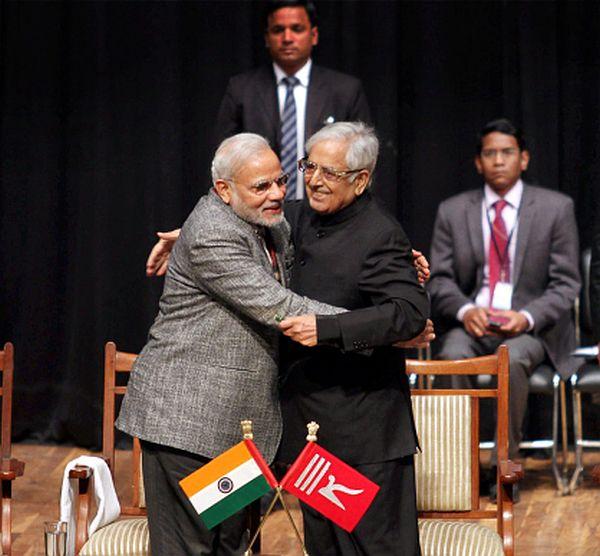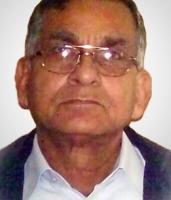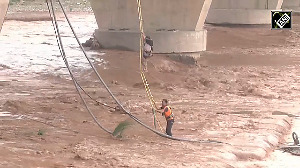'BJP-PDP alliance has hurt the national interest, only helped subversives and separatists'
'BJP has virtually become the mouthpiece of the Kashmiri parties'
'My expulsion has hurt the very vast nationalist constituency in the state and outside'
Expelled BJP ideologue Prof Hari Om speaks to Pervez Majeed.

When the Bharatiya Janata Party entered into an alliance with the Peoples Democratic Party to form a government in Jammu and Kashmir, it was termed as a “historic victory” by the BJP leaders, asserting that party’s ascendency has finally reached the country’s only Muslim-majority state.
However, BJP’s front-line ideologue in the state, Professor Hari Om, severely opposed the alliance, terming it the BJP’s “betrayal” of the people who voted for it. Since then, Om has been writing against the party. After his “unsatisfactory explanation” to the show-cause notice served on him, on November 23 he was expelled from the party’s primary membership for six years by state president Jugal Kishore Sharma, on account of his “gross indiscipline, anti-party activities and un-repentance for his misconduct.”
A former professor of history at the Jammu University, Professor Om, 70, is considered a ‘thought leader’ of the party who has been profusely writing columns in local and national newspapers espousing the cause of BJP. During the previous assembly elections, he wrote the party’s election manifesto, galvanised intellectual support, and remained at the vanguard of the election campaign. Till recently he was political advisor to the state BJP president.
In his first interview after expulsion, Professor Om, image, left, tells Pervez Majeed that the BJP has “bartered on its ideology” by joining hands with the “pro-Pakistan PDP”.
 What do you think is the basic reason behind your expulsion?
What do you think is the basic reason behind your expulsion?
Because of my stand on national unity, the political status of Jammu province and Ladakh region, my rational and national suggestion that the BJP shouldn’t forge an alliance with the PDP.
Because the PDP has been subverting the polity both from within and outside to push forward its agenda, which is to promote the Pakistani cause in J&K.
The other reason is my insistence on the division of J&K. I have all along held the view that a solution to the problem in Kashmir lies in the trifurcation of the state and bifurcation of the valley.
You are considered a staunch BJP ideologue in the state. Are you hurt by this action?
It was expected. After all, I was taking a line that was against the PDP-BJP alliance. I call it the agenda of subversion, agenda of subjugation and another rivet in the chain of Jammu’s slavery.
I wrote to the BJP national president a number of times urging him to review this ‘agenda’ to protect and promote further the national interest in J&K as well as the interests of teh people of Jammu province, Ladakh region, internally-displaced Kashmiri Hindus and refugees from Pakistan and Pakistani-Occupied Kashmir, without jeopardising the interests of the people of Kashmir.
But with no result. My expulsion has hurt the very vast nationalist constituency in the state and outside who share my views. But this doesn’t suit the BJP here because they are more interested in being in power than protecting the party’s ideology.
How is the BJP’s forging alliance with the PDP against the party’s ideology?
This alliance has hurt the national interest. It has only helped subversives and separatists in the valley to the extent that Kashmir has been witnessing anti-India events at regular intervals.
The PDP-BJP coalition government has allowed separatists and communalists in the valley to further muddy Indian waters in the state and the result has been that these people have been raising Pakistani and Islamic State flags every Friday.
Besides, this alliance has rigorously excluded the Jammu province from the state cabinet and the governance of the state. It has sought to divide the Jammu province so that the votaries of ‘Greater Kashmir’ achieve their objective.
It has denigrated 'Dogriyat' and 'Ladakhiyat' by recognising only the regressive and intolerant 'Kashmiriyat'. It has denied refugees from Pakistan and internally-displaced Kashmiri Hindus their legitimate rights.
But more than that, the alliance has vouched for the state’s special status, recognised Pakistan and Hurriyat leaders stakeholders in J&K, talks of withdrawal of the Armed Forces (Special Powers) Acts, the Public Safety Act and similar other legislations, denied the people of Jammu province due representation in the assembly and so on.
All this is against the BJP’s core ideology.
Will you meet the BJP president or the prime minister to present your case?
I will meet them, if invited. I have already written to the party president and explained my position and stand. How can I go to Delhi to meet them when nobody in the party thought it desirable to discuss the issues raised by me from time to time?
I have not left the BJP; the BJP has expelled me for no reason. It has punished me because of my insistence on the ideology the BJP used to preach before the 2014 assembly elections in J&K.
You have said the BJP’s alliance with the PDP is the reason behind Bihar defeat. How?
The mahagathbandhan (grand alliance) in Bihar exploited the PDP-BJP alliance to the hilt during the election campaign. It exposed the BJP’s concept of nationalism, its U-turn on Article 370 and sought to create an impression that the party’s only ideology is power.
The BJP’s critics did their best to create an impression in Bihar that the party compromised its ideology and bartered national interests by forging an alliance with what they called a “pro-Pakistan PDP”.
It also exploited Chief Minister Mufti Mohammad Sayeed’s March 1, 2015, statement that credited Pakistan and militants for the successful conduct of the assembly elections in the state.
The BJP, for the first time, got an opportunity to be a part of the government in J&K. Why would the party let go of this historic prospect?
The BJP was the only party in the state which used to fight for the nationalist as well as other causes.
It was the only opposition party in the sensitive state, as the National Conference, the PDP and Congress belonged to that school of thought that considered J&K an unsettled issue, and that longed for the imposition of the separatists’ will on the people of Jammu and Ladakh, besides many religious and ethnic minorities in the state.
The BJP should have taken these realities into consideration and sat in the opposition to defeat the anti-national and anti-Jammu and anti-Ladakh games the Kashmiri parties have played all along, and continue to play.
By entering into an alliance with the pro self-rule party, the BJP has virtually become the mouthpiece of the Kashmiri parties, and the result is that there is no opposition left in the state. Indeed, for the PDP, the alliance with the BJP is a historic opportunity to push forward its own agenda. As for the BJP, it is nothing but suicide.
The BJP has Nirmal Singh as deputy chief minister in the government. What are your comments about his performance?
It is for the people of Jammu province who gave a massive mandate to the BJP to comment on the deputy chief minister’s performance. They have, in fact, made certain comments and a reference to two instances would be quite in order.
One, they didn’t appreciate the Dy CM’s April 24 statement that no power “can snatch All India Institute of Medical Sciences from Kashmir and it will not be established in Jammu”.
Two, his statement on the National Hydroelectric Power Corporation-run power projects that ‘New Delhi was using the J&K territories and state waters and that we will make New Delhi hand over at least two projects to the state government’ didn’t go well with the people of Jammu province.
On the other hand, many people in Kashmir are criticising the PDP for its alliance with the BJP, saying it paved way for the party and the Rashtriya Swayamsevak Sangh to settle in J&K…
It is a politically motivated statement. The RSS and the BJP have no place whatsoever in the Kashmiri Muslims’ scheme of things. That’s it.
You were close to the RSS. What kind of role do they (the RSS) have in the state government?
The BJP is the political organ of the RSS. Nothing moves in the BJP without the concurrence of the RSS, as all the general secretaries (organisation) are from the RSS. The RSS and the BJP work in unison.
PDP leaders have been saying that the Jammu region having a share in government is an opportunity for bridging the gap between the two regions. Do you agree?
Kashmir controls the state cabinet and the civil secretariat. All the portfolios with considerable political weight, funds and patronage are with the PDP. The ministries with the BJP are in a shambles. The plight of people of Jammu province was never so pathetic as it has been since this government has been formed.
There is speculation that Mehbooba Mufti will replace her father as CM, and the latter too has hinted at the same…
That would be a sad day for the nationalist people of the state in general and Jammu and Ladakh, and in particular, and the nation as a whole. The BJP would commit an unpardonable sin if it endorses Mehbooba Mufti. She does not consider J&K an integral part of India.
Some people opine that the recent beef controversy further widened the gap between Kashmir and Jammu regions.
There is some truth in it. The statements made by certain PDP, NC, Congress and Communist Party of India-Marxist leaders, as also by member of legislative assembly Engineer Rasheed did outrage the religious sensitivities of the Hindus of Jammu, or rather, Hindus across the nation.
What shocked them all the more was the holding of a beef party in Srinagar MLA's Hostel. And also, the way the additional advocate general and the deputy advocate general who were from the BJP-RSS quota, were removed from their respective positions.
Image: (top) Prime Minister Narendra Modi hugs Jammu and Kashmir Chief Minister Mufti Mohammad Sayeed after the swearing-in ceremony in Jammu, March 1, 2015. Photograph: PTI Photo.











